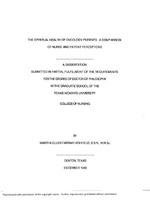| dc.contributor.author | DeKeyser Ganz, Freda | en |
| dc.contributor.author | Andrews, Caryn | en |
| dc.date.accessioned | 2016-07-13T11:14:03Z | |
| dc.date.available | 2016-07-13T11:14:03Z | |
| dc.date.issued | 2016-07-13 | |
| dc.date.issued | 2016-07-13 | |
| dc.identifier | INRC16PST47 | en |
| dc.identifier.uri | http://hdl.handle.net/10755/616501 | |
| dc.description | <p>Theme: Leading Global Research: Advancing Practice, Advocacy, and Policy</p> | en |
| dc.description.abstract | <p>Session presented on Thursday, July 21 2016 and Friday, July 22 2016:</p>
<p><strong>Purpose:</strong> Approximately 30-40% of the deaths in the US occur in the Intensive Care Unit (ICU) or after ICU discharge1. Most of these deaths did not occur suddenly but were the final result of a process of physiological decompensation towards end-of-life 2. Palliative care is a treatment approach whose goal is to improve quality of life and relieve the suffering of patients and their families, often at end-of-life. 3. Its adoption has been met with resistance in the ICU, often due to the underlying culture (save life at any cost) and a sense of failure when moving from curative treatments to palliative care 4. Oncology nurses are not necessarily more adept at providing palliative care services to patients with cancer. Recently the emphasis on including palliative care services within general oncology services has been suggested as part of National Cancer Center Network (NCCN) guidelines for supportive care 5,6. In these guidelines it has been suggested that palliative care be a part of all cancer treatment, on a trajectory from cure to end-of-life. Therefore the purpose of this study was to compare the knowledge, attitudes and behaviors of intensive care with oncology nurses related to palliative care.</p>
<p><strong>Methods:</strong></p>
<p><strong>Design:</strong> Web based survey Sample: The sample was a convenience sample of 126 members of the Israel Association for Cardiology and Intensive Care Nurses and of the Israel Oncology Nursing Society.</p>
<p><strong>Data collection: </strong>Data were collected after institutional and ethical approval. An on-line survey using MySurveyLab was sent to all of the members of the two nursing associations. Responses were returned to the authors without any identifying information. Instruments: The survey included a questionnaire based on that of Montagnini, Smith & Balistrieri 7, based on self- efficacy theory that measures nurses' self- perceptions of their knowledge, attitudes and behaviors related to palliative care. Knowledge is defined as the confidence that a respondent possess the information necessary to perform end-of-life palliative care practices such as symptom control or spiritual support 7. Attitude is defined as a personal evaluation of end-of-life palliative care practices such as feeling comfortable discussing advance care directives with patients and families 7. Behaviors are defined as the confidence to perform of end-of-life palliative care practices such as initiating advance care planning with patients and families7. Cronbach's alpha reliability for the questionnaire in the current study was .90. A demographic and work characteristics questionnaire was also included in the survey.</p>
<p><strong>Analysis:</strong> Descriptive statistics (including frequencies, means and standard deviations, medians) were calculated for the entire questionnaire as well as for its sub-sections (knowledge, attitudes and behaviors). Differences between oncology and intensive care nurses were determined using Independent t tests.</p>
<p><strong>Results:</strong> The sample consisted of 126 nurses, 79 oncology and 47 intensive care nurses. The majority of the sample was female (n= 115, 91%), married (n=99, 79%), and Jewish (n=111, 88%). Almost half worked as staff nurses (n=58, 46%) with post-basic certification (n=102, 81%) with a mean age of 48.6 years (SD=10.6) and 10.0 (SD=10.3) or 15.0 (SD=8.9) years of experience as an oncology or intensive care nurse, respectively. Mean total scores for the knowledge section of the questionnaire were 45.1 (SD=7.9) and 41.7 (SD=10.6) (out of a possible 60) for the oncology and intensive care nurses, respectively. Mean attitude scores for the oncology nurses was 19.6 (SD=4.3) and 19.1 (SD=5.0) for intensive care nurses (out of a possible 25). Mean behavior scores were 26.8 (SD=13.0) and 27.2 (SD=9.7) for oncology and intensive care nurses, respectively (out of a possible 55). No significant differences were found between oncology and intensive care nurses on any of the sections of the questionnaire.</p>
<p><strong>Conclusion:</strong> The oncology and intensive care nurses in this sample showed moderate levels of self-perceived knowledge and attitudes towards palliative care however the level of their self-reported behaviors was low. While oncology nurses tended to score slightly higher than those from critical care, these differences were not found to be significant. Results from the original study of self-perceived knowledge, attitudes and behaviors of American ICU nurses, found higher scores on all of the subscales 7. Others 8 from China found that nurses from intensive care units scored higher compared to oncology nurses on a measure of knowledge and attitudes on comfort care. Nurses (including intensive care and oncology nurses) from southeast Iran also scored low on knowledge about palliative care 9. Therefore, culture seems to play a role in the self-perceived knowledge, attitudes and behaviors related to palliative care. Efforts should be made to educate all nurses, including those in oncology, about palliative care. Further research should be conducted related to how to better introduce and implement palliative care.</p> | en |
| dc.format | Text-based Document | en |
| dc.language.iso | en | en |
| dc.subject | Oncology | en |
| dc.subject | Intensive Care | en |
| dc.subject | Palliative Care | en |
| dc.title | A comparison of intensive care versus oncology nurses' knowledge, attitudes and behaviors of palliative care | en |
| dc.type | Poster | en |
| dc.rights.holder | <p>
All rights reserved by the author(s) and/or publisher(s) listed in this item record unless relinquished in whole or part by a rights notation or a Creative Commons License present in this item record.
</p><p>
All permission requests should be directed accordingly and not to the Sigma Repository.
</p><p>
All submitting authors or publishers have affirmed that when using material in their work where they do not own copyright, they have obtained permission of the copyright holder prior to submission and the rights holder has been acknowledged as necessary.
</p> | en |
| dc.description.note | <p>Items submitted to a conference/event were evaluated/peer-reviewed at the time of abstract submission to the event. No other peer-review was provided prior to submission to the Henderson Repository.</p> | en |
| dc.type.category | Full-text | en |
| dc.evidence.level | N/A | en |
| dc.research.approach | N/A | en |
| dc.contributor.department | Pi at-Large | en |
| dc.author.details | Freda DeKeyser Ganz, RN; Caryn Andrews, RN, CRNP | en |
| dc.conference.name | 27th international Nursing Research Congress | en |
| dc.conference.host | Sigma Theta Tau International | en |
| dc.conference.location | Cape Town, South Africa | en |
| dc.date.conferenceyear | 2016 | |
| dc.description.reviewtype | Abstract Review Only: Reviewed by Event Host | en |
| dc.description.acquisition | Proxy-submission | en |





